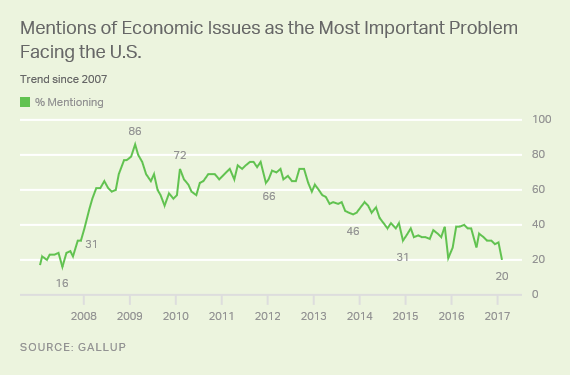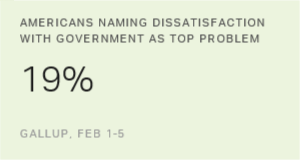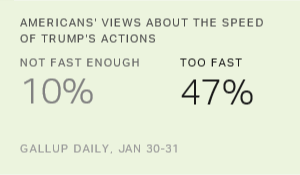Story Highlights
- 19% name government dissatisfaction, highest since 2015
- Immigration, national unity spike as concerns
- Mentions of economic problems lowest since 2007
WASHINGTON, D.C. -- Dissatisfaction with the government now clearly leads as the issue Americans see as the most important problem facing the U.S. The 19% mentioning the government is up from 11% last month and is now significantly higher than the percentage mentioning any other issue. The next-most-commonly mentioned problems are immigration (13%) and unifying the country (10%) -- both up from last month -- as well as the economy in general (9%).
| January 2017 | February 2017 | ||||||||||||||||||||||||||||||||||||||||||||||||||||||||||||||||||||||||||||||||||||||||||||||||||
|---|---|---|---|---|---|---|---|---|---|---|---|---|---|---|---|---|---|---|---|---|---|---|---|---|---|---|---|---|---|---|---|---|---|---|---|---|---|---|---|---|---|---|---|---|---|---|---|---|---|---|---|---|---|---|---|---|---|---|---|---|---|---|---|---|---|---|---|---|---|---|---|---|---|---|---|---|---|---|---|---|---|---|---|---|---|---|---|---|---|---|---|---|---|---|---|---|---|---|---|
| % Mentioning | % Mentioning | ||||||||||||||||||||||||||||||||||||||||||||||||||||||||||||||||||||||||||||||||||||||||||||||||||
| Dissatisfaction with government | 11 | 19 | |||||||||||||||||||||||||||||||||||||||||||||||||||||||||||||||||||||||||||||||||||||||||||||||||
| Immigration | 4 | 13 | |||||||||||||||||||||||||||||||||||||||||||||||||||||||||||||||||||||||||||||||||||||||||||||||||
| Unifying the country | 3 | 10 | |||||||||||||||||||||||||||||||||||||||||||||||||||||||||||||||||||||||||||||||||||||||||||||||||
| Economy (general) | 11 | 9 | |||||||||||||||||||||||||||||||||||||||||||||||||||||||||||||||||||||||||||||||||||||||||||||||||
| Race relations/Racism | 10 | 7 | |||||||||||||||||||||||||||||||||||||||||||||||||||||||||||||||||||||||||||||||||||||||||||||||||
| Unemployment | 8 | 6 | |||||||||||||||||||||||||||||||||||||||||||||||||||||||||||||||||||||||||||||||||||||||||||||||||
| National security | 3 | 5 | |||||||||||||||||||||||||||||||||||||||||||||||||||||||||||||||||||||||||||||||||||||||||||||||||
| Terrorism | 5 | 5 | |||||||||||||||||||||||||||||||||||||||||||||||||||||||||||||||||||||||||||||||||||||||||||||||||
| Healthcare | 9 | 5 | |||||||||||||||||||||||||||||||||||||||||||||||||||||||||||||||||||||||||||||||||||||||||||||||||
| Education | 4 | 3 | |||||||||||||||||||||||||||||||||||||||||||||||||||||||||||||||||||||||||||||||||||||||||||||||||
| Gallup | |||||||||||||||||||||||||||||||||||||||||||||||||||||||||||||||||||||||||||||||||||||||||||||||||||
Government dissatisfaction -- representing an assortment of complaints about the federal government -- has consistently ranked near the top of the most important problem list over the last few years. However, the last time it was No. 1 on the list by a significant margin over all other issues was in April 2015. Mentions of government have been higher in the past, including several readings in the 20s in 2013 and 2014. The all-time high of 33% occurred in October 2013 during the partial federal government shutdown.
Mentions of "Donald Trump" as the nation's most important problem constitute a substantial proportion of the responses making up the "government dissatisfaction" category this month. Prior to Trump's inauguration, mentions of him fell into the "election" rather than the government category. As a result, the percentage citing the election as the most important problem has dwindled from 8% in January to less than 1% this month, while the percentage mentioning government dissatisfaction has increased by roughly the same amount.
Given that Republicans now control the presidency and both houses of Congress, it is not surprising that Democrats (29%) are much more likely than Republicans (11%) to say the government is the most important problem facing the country. Eighteen percent of independents also name government as the top problem.
Trump has taken swift action to deal with immigration since taking office, including issuing a series of executive orders that suspended the Syrian refugee program, banned entry to the U.S. for nonresidents traveling from seven predominantly Muslim nations and ordered the construction of a wall along the U.S.-Mexico border. Those high-profile actions likely explain this month's increased mentions of immigration on the most important problem list, from 4% in January to 13% currently. Immigration now ranks as the top problem among Republicans, at 18%. Half as many Democrats, 9%, name immigration.
Mentions of immigration have reached double digits on several occasions in the past few years. The last time the percentage exceeded the current 13% was in the summer of 2014, when a flood of Central American women and children immigrated to the U.S.
Also, Trump's provocative nature and controversial actions have sparked protests throughout the country, likely explaining the increased percentage of Americans naming "unifying the country" as the most important problem. The 10% who cite lack of unity as the most important problem is the highest Gallup has measured to date for this issue. No more than 3% of Americans ever mentioned this issue until after the 2016 presidential election, when 6% did. Roughly equal percentages of Democrats (12%) and Republicans (11%) currently mention unifying the country.
The news media's recent focus on Trump over most other issues, as well as Americans' generally positive evaluations of the economy, may explain why mentions of economic problems as the nation's top problem are down this month. The 20% who mention some economic problem -- including the economy in general, unemployment, the federal budget and others -- is the lowest Gallup has measured since July 2007, when mentions were 16%. That poll was conducted before the economy headed into recession and when the Iraq War was the dominant concern in Americans' minds.

Implications
Americans' perceptions of the most important U.S. problem have changed since Trump became president. Last month, there was no consensus as to the most important problem facing the country. Now, dissatisfaction with government is the clear leader, mostly because Trump has moved from being president-elect to being the chief executive of the federal government.
The Trump administration's early focus on immigration has appeared to increase concerns about that issue. Also, his presidency appears to have created bipartisan concern about the need to unify the U.S. Although party supporters on both sides share concerns about the divided nature of the country, it is possible that Democrats are looking to Trump to modify his behavior and policies to bring both parties together. At the same time, Republicans may believe Trump's opponents should be more open to supporting the president and those who back him.
Historical data are available in Gallup Analytics.
Survey Methods
Results for this Gallup poll are based on telephone interviews conducted Feb. 1-5, 2017, with a random sample of 1,035 adults, aged 18 and older, living in all 50 U.S. states and the District of Columbia. For results based on the total sample of national adults, the margin of sampling error is ±4 percentage points at the 95% confidence level. All reported margins of sampling error include computed design effects for weighting.
Each sample of national adults includes a minimum quota of 70% cellphone respondents and 30% landline respondents, with additional minimum quotas by time zone within region. Landline and cellular telephone numbers are selected using random-digit-dial methods.
View survey methodology, complete question responses and trends.
Learn more about how the Gallup Poll Social Series works.




